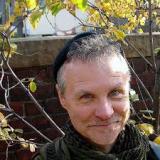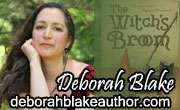Paganistan: Notes from the Secret Commonwealth
In Which One Midwest Man-in-Black Confers, Converses & Otherwise Hob-Nobs with his Fellow Hob-Men (& -Women) Concerning the Sundry Ways of the Famed but Ill-Starred Tribe of Witches.
A People in Motion
In the Forest of the Hwicce
Place-names have a long memory.
Six surviving place-names in modern Britain preserve the memory of the Hwicce, the original Anglo-Saxon Tribe of Witches, who for some 225 years inhabited a territory in the Cotswolds and Severn Basin of what is now southwestern England: Whichford (Warwickshire), Wichenford, Wychbury Hill, Wyche, and Droitwich (Worcestershire), and Wychwood (Oxfordshire). Unsurprisingly, with one exception, all of them lie within the boundaries of the original Kingdom (or occasionally—witches being witches—Queendom) of the Witches.
Wychwood, the “forest of the Hwicce,” is the anomalous outlier.
Not all witches, of course, are witches. With trees, in particular, you have to be careful. Both the witch elm and witch hazel originally had nothing to do with witches of our sort, but derive instead from yet another Anglo-Saxon root (wice) meaning “bendable, pliable.” (The same root survives in “wicker.”)
Flexible as we may be, though, historical data makes it clear that the witches of Wychwood were originally the H-and-Two-C, and not the No-H-and-One-C, kind.
So how did Hwicce end up in non-Hwicce territory?
Well, an explanation's not far to find. People move around. North of Minneapolis' twin-sister city, known to cowans as “St. Paul”, lies a suburb called Little Canada.
Three guesses as to why it's called that.
Witches are a people in motion. From the banks of the River Severn, we've now spread to every continent on Earth, including (surprise!) Antarctica.
A people in motion. Looks like we've been that way for a long, long time.
Comments
-
 Thursday, 27 July 2023
Thursday, 27 July 2023Thanks, Victoria: good eye. I praise your thoroughness.
My friend and colleague Volkhvy always says, "We're not reconstructing the past, we're reconstructing the future." Whether or not Witches ever were a tribe in the past--which seems to me historically (and linguistically) dubious--I would contend that we are now, or are (at least) in the process of becoming one.
That's the extended metaphor that I engage here. The historical paganisms were all ethnic, religions of a given people. A paganism that is no more than me and my gods ends with me. Us and our gods, though: that's a sustainable arrangement. If, as a group, we're to go forward into the future, it seems to me that that needs to be our direction.
What I write here is not history but mythic history. When it comes to religion, myth trumps history every time. -
 Wednesday, 09 August 2023
Wednesday, 09 August 2023I would say as neopagans we are constructing our futures rather than reconstructing THE future. I'm not sure if we are in the process of becoming a tribe as many pagans use magic but not all of us call ourselves witches. Not only that but many of us follow a recontructionist path that represents our own cultural and ancestral heritage and as such don't appreciate a rewriting of the past that flies in the face of history and linguistics.
Frankly, and correct me if I am wrong you seem to be advocating for a unidirectional neopagan future; "If, as a group, we're to go forward into the future, it seems to me that that needs to be our direction". Seriously? What exactly are you advocating here? -
Please login first in order for you to submit comments





















You are conflating the OE wicce/wicca with the tribal name Hwicce,. The tribal name Hwicce is attested in Latin and OE sources as Huicciorum, Hwinca, Hynica, Hywnca, Hwca etc. Hwicce, were an early medieval sub-kingdom of Mercia which broadly covered the area that today is Worcestershire, Warwickshire and Gloucestershire.
The origin of Hwicce has not been definitively established but the suggestions are that they may have been of British Celtic origin (Coates, 2013, The Name of the Hwicce: A Discussion) Or were a well established Anglo-Saxon group bearing very old folk-name, perhaps going back to the pre-migration age (Sims-Williams, Religion and Literature in Western England 600–800, Cambridge, 1990),
Your conclusion that Hwicce is somehow related to witches due to its similarity to wicce is fanciful. It is perhaps based Yeates, 'The Tribe of Witches: the Religion of the Dobunni and Hwicce' (Oxford, 2008),? Yeates is rejected by academics and as noted by Dr Caitlin R Green in her blog of the Hwicce Yeates theory would also not be compatible with the idea of the Hwicce having been based in the Rutland area in the early Anglo-Saxon period.
Caitlin Greens blog on the Hwicce is here:
https://www.caitlingreen.org/2016/03/the-hwicce-of-rutland.html
Etymology of the name Hwicce does not support your conclusion, in that Hwicce in Anglo-Saxon (AS) = 'locker, chest, trunk'. Source:
https://www.historyfiles.co.uk/FeaturesBritain/EnglandHwicce01.htm
Wychenford =ford of Hwicce
Etymology here:
http://epns.nottingham.ac.uk/browse/id/53288a23b47fc40d6b00060e
Droitwich may not be associated to the Hwicce as wic just means village. Etymology:
https://epns.nottingham.ac.uk/browse/Worcestershire/Droitwich/53288a22b47fc40d6b00057a-Droitwich
Likewise with the other placenames that incorporate Hwicce, simply mean hill of the Hwicce, wood of the Hwicce etc. etc
Place-names that incorporate Old English wic, (middle english and modern english spellings=wick, wych, wich, week, wyke and other vatiations) have nothing to do with the Hwicce as OE wic means dwelling place, abode, collection of buildings for a specialised purpose.
For full etymology and discussion of OE wic see:
https://www.etymonline.com/search?q=wic
And/Or Durham and Smith, The wic element in Place Names, 2019